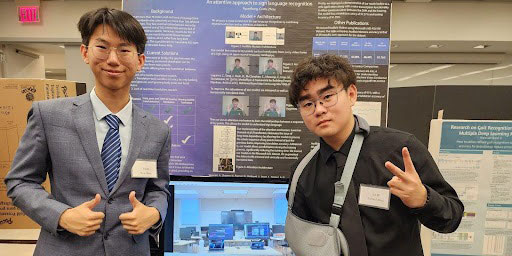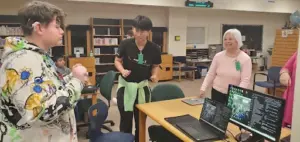Chapel Talk: Finding My Passion in Computer Science

My journey with computers started with me getting my first iPad. At the reckless age of eight, I was obsessed with Plants vs Zombies. My passion for gaming quickly developed into a passion for coding as I learned programming languages like Java, C++ and Python through middle school. I continued my studies at Peddie and took AP Computer Science with Mr. Luo during my sophomore year. But up until that point, to me computer science always meant algorithms and lines of code- zeros and ones floating on a laptop screen. It was distant from every other aspect of my life: only a geekish interest. However, this perception changed during my sophomore summer when an idea sparked in my mind. I was in a Zoom class with my face in a little box among others’ faces in little boxes, and it suddenly struck me: How would people who are deaf and hard of hearing communicate effectively over Zoom? It would be difficult for them to type every word on a chat box and wait for someone to read it. They can even be left out of discussions and conversations. I wondered if there was a more effective solution, one that allows the deaf and hard of hearing to communicate freely and fluently with others.
Curious, I researched online. It is estimated that around 40 million Americans have some trouble hearing. Of those, one million use American Sign Language (or ASL) regularly to communicate with others. But to my surprise, there are no publicly accessible apps or software to translate ASL. So, I dug deeper. I read research papers, articles, blogs, and formulated a computer science project to use machine learning to achieve sign language recognition. But the problem with sign language translation is its complexity. Instead of 26 letters that construct the whole English language, sign language depends on 3D hand gestures, facial expressions, body poses and more. Building a model to incorporate all of these features and accurately translate them is a mountainous task. I then reached out to my friend and partner, Curtis Zhou ’24, for help. After spending months collecting data, building models in Python and training and fine-tuning our model, we achieved accurate sign recognition over a dataset of 100 signs.
However, building the model was just a start. I wanted my app to be accessible to the public, not just a coding project on my computer. Since hosting a machine learning model online is quite costly, Curtis and I decided to compete in the 2023 Microsoft Imagine Cup. This allowed us to use a free account with $200 worth of credit to build an online infrastructure. After designing a website with Curtis, hosting the model online, connecting the front end with the back end and spending the whole long weekend at the Kalahari Resort & Convention Center in the Poconos cooped up in my hotel room fixing bugs and errors, I finally had a running prototype.
We submitted our project to Microsoft, passed the screening round, then the regional and made it to the finals for the Americas region, where we won the Lifestyle Category for the best product. The prize was $2,500 to further fund and develop our app. We continued working on our project and brought it to the local Terra North Jersey Science Fair, where our project won first place in the Computer Science category.
When we presented our poster in a crowded room, a judge walked up to me. She was a public school teacher who interacted with students that are deaf and hard of hearing on a daily basis. She told me that with something like this in their classroom, she could communicate better with her students. And that was when it struck me that my little project had broader applications that could help students better communicate in classrooms. I wanted to work towards that exact goal.
Last fall, with the help of Computer Science Teacher Mrs. Wolfe, I had the privilege of working on my ASL translator app with students at the Marie H. Katzenbach School for the Deaf in Trenton. I had never worked so closely with people who are deaf and hard of hearing, and I remember how nervous I was the day before. I practiced my basic ASL and learned how to introduce myself. I was afraid that I would have a hard time communicating. But my worries quickly vanished when the students at Katzenbach welcomed me with hospitality. I invited them to try out my app. When they saw the translation of what they signed appear on the computer screen, their eyes lit up.

I realized how basic communication I took for granted came so costly for those children, and how my project could work towards helping them bridge this communication gap. I met one person in particular: Edison. He is a middle school student and a computer scientist himself. He has been learning Java and Python and now aspires to tackle machine learning problems like sign language translation in the future.
Computer science is a lot more than just code and algorithms, floating digits on a screen, or the “nerdy” subject- it is something tangible, alive and has the potential to benefit others. As a senior and a passionate computer scientist, I wish to encourage my fellow Peddie students to take a stab at computer science. Try Programming I. Sign up for the annual Peddie Hackathon during the summer. No previous experience is required. Computer science could just be one more tool in your tool shed to build great projects one day. I want to thank Mrs. Wolfe for her relentless support of me. I want to thank Curtis for his endless collaboration and support. And I want to thank Peddie for everything it has given me. I will leave you with a few words: Find your passion, and find a way to help others with it. I found my passion in computer science, and learned how I can use it to give others a voice.